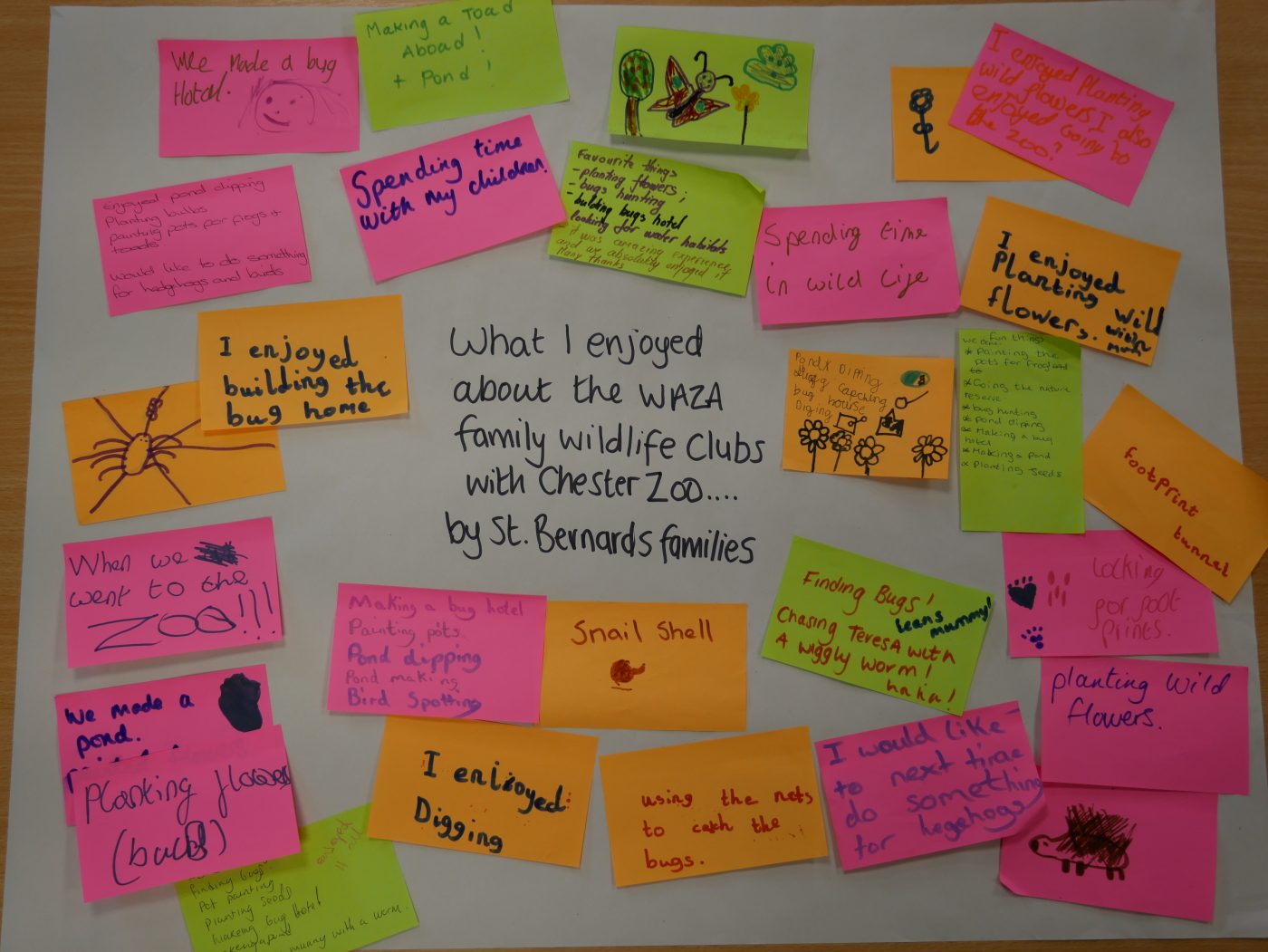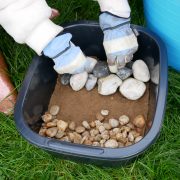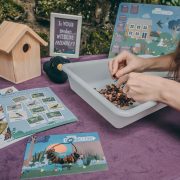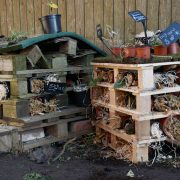Category: Our Community
Dozens of large heath butterflies, carefully bred at the zoo, are returning to the North West of England – where they have been missing for 150 years.
Large heath butterflies, once commonly found across the region, disappeared from Greater Manchester over a century ago following the destruction of their habitat for agricultural land, leaving just a few small isolated populations in other parts of the country.
Experts at The Lancashire Wildlife Trust collected six more wild female butterflies from a surviving population and transported them to us.
A team of four specialist invertebrate keepers then spent a year caring for and breeding the butterflies; creating bespoke enclosures for egg laying, rearing the caterpillars and then finally the pupation stage, all in a special behind-the-scenes breeding facility.
Under the watchful eye of our team, 45 pupae are now being transported in stages to their new home in a secret location in the peatlands of Greater Manchester. Here, they undergo their magical transformation and emerge from their pupae as large heath butterflies in protected tents – before being reintroduced into the wild.
Heather Prince, part of our invertebrate team, said:
“Breeding and rearing butterflies in an incredibly delicate process that requires a fine balance of conditions at each part of their lifecycle. Countless hours have been spent inside our specialised breeding centre nurturing the tiny eggs, rearing the caterpillars and caring for their host plants as well as monitoring their final pupation period throughout the winter months.
“Butterflies have undergone a huge decline in the last 40 years in the UK, with more than 20% disappearing altogether as a result of habitat loss. So, it is incredibly rewarding to see large heath butterflies fluttering around in their new home – and know that we’ve contributed to bringing them back from extinction in this area.”
The main threat to the large heath butterfly in the UK is loss of the habitat which the species relies on to thrive, including peatland and boggy areas. A 2019 State of Nature report revealed that 41% of all UK species have declined and that at least one in ten now face extinction – with butterflies and moths suffering sharp declines of 17% and 25% respectively.
The team at The Lancashire Wildlife Trust have spent a number of years restoring specially chosen sites to their former glory and a handful of areas are now at a stage where they can support new populations of large heath butterflies once again.
Jo Kennedy, Great Manchester Wetlands Project Co-ordinator at Lancashire Wildlife Trust, added:
“Across our region we have lost 98% of our lowland raised bogs, creating a huge hole in our biodiversity. To function as a healthy ecosystem, we need a tapestry of different and connected habitats each supporting a variety of plants and animals.
“Boggy, healthy peatlands not only support that precious biodiversity, but also provide a vital natural resource in the fight against climate change. Healthy peatlands store huge amounts of carbon, but as soon as they are damaged this carbon is released into the atmosphere contributing to greenhouse gas emissions.”
We worked with 146 people from 53 families and together took over 620 positive actions to support biodiversity at school and in the families own green spaces.
Our Wildlife Connections Campaign is all about bringing people together to create safe spaces for UK wildlife. By creating connections from one wildlife-friendly space to the next we can create wildlife highways through our neighbourhoods and protect the precious wildlife that we love.
Between October 2019 and February 2020 we set up Family Wildlife Clubs at five schools local to Chester Zoo, bringing together families to improve their school grounds and own green spaces for wildlife. Through this project we engaged new audiences within our local communities, providing opportunities for them to develop the skills and knowledge to be able to take action for UK wildlife and play their part in improving biodiversity.
The project was funded by the World Association of Zoos and Aquariums (WAZA) Nature Connects Grant which is awarded to international projects that aim to bring families together to experience their natural environment and take action for wildlife.
At each school site we planted mini wild flower meadows, planted trees, built giant bug hotels and made their school grounds a better place for people to enjoy. The families also made animal habitats to take home to make their green spaces better for wildlife, including making mini ponds, mini bug hotels, bat boxes and bird boxes.
By taking these actions to make more and better connected wildlife friendly spaces we can help to combat the threats faced by UK Wildlife, including the loss of suitable habitats and loss of connectivity between habitats. At each school we did basic wildlife surveys before taking action and will support the schools to monitor changes over the coming years and to promote biodiversity on their school grounds and surrounding communities.
The Family Wildlife Clubs brought intergenerational groups together to gain the skills and knowledge to make positive changes for local wildlife. As well as supporting skill and knowledge development, the experience also benefitted the participants personally and in their family relationships.
“I enjoyed spending time outdoors with my son and the group”.
– parent from Sandy Croft School
The knowledge and skills gained through the session encouraged people to take action in their own green spaces too.

“Using knowledge of different habitats we have implemented some of the practical habitats in our gardens.”
– parent from Liscard Primary School
Five fluffy penguin chicks have hatched at the zoo – and our keepers have named them after NHS Heroes and hospitals.
We’ve been absolutely BLOWN AWAY by all the amazing work that you’ve all been doing whilst watching our Virtual Zoo Days over the last few weeks.
Whether you’ve been creating your own zoos, colouring in our animal masks, or making your own fact files – it’s all fantastic learning and we’ve really enjoyed seeing what you’ve been getting up to.
The delightful duo arrived to seven year old mum Fiona following 135-day-long pregnancy and have been clinging tightly to her ever since.
As we approach Mother’s Day, we shine a light on the special women in our lives, who have watched us grow, taught us right from wrong and held our hand through the highs and lows of adolescent life. Some mothers live high up in trees in the tropical rainforests across Sumatra, and have to fight to help protect their families from an ever-changing world, that is driving their species to extinction.
A group of tropical snails, believed to be extinct for more than 15 YEARS, have been released back to the wild by conservationists at Chester Zoo.
Three TINY chameleons have hatched at Chester Zoo… and each one is barely bigger than a pencil tip!
Five Asian short clawed otter pups were born in December, ready for their Christmas health checks!



